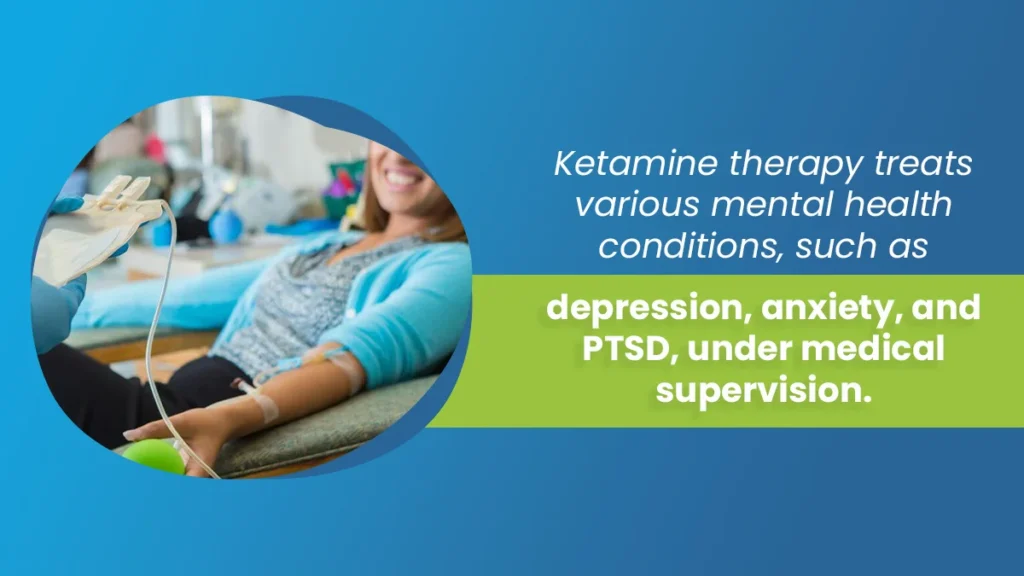Ketamine therapy, an emerging frontier in mental health, utilizes the anesthetic ketamine to address treatment-resistant conditions like depression and anxiety symptoms. It offers rapid relief compared to traditional antidepressants.
Ketamine is administered through infusion, injection, or nasal spray in clinical settings. Understanding its uses and effects is imperative in navigating the evolving landscape of mental health care.
Key Takeaways
Ketamine therapy is used for various medical purposes and psychiatric conditions. Here is what the article talks about.
- Ketamine therapy affects glutamate receptors in the brain, leading to changes associated with mood regulation.
- Ketamine therapy involves a series of sessions where the drug is administered under medical supervision.
- Various side effects and risk factors are associated with the chronic and prolonged use of Ketamine.
Take the first step towards recovery from substance use disorder (SUD) at The Haven Detox-New England. Contact us at (844) 9334145 for further assistance.

Understanding Ketamine Therapy
Ketamine was first synthesized by Calvin Stevens in 1962. Initially developed as a replacement for PCP in medical settings, it quickly gained popularity due to its unique anesthetic properties. The United States Food and Drug Administration (FDA) approved Ketamine for medical use in 1970, marking the beginning of its clinical applications.
Ketamine’s primary role lies in anesthesia, especially when other anesthetics might be contraindicated or less effective. Its dissociative properties make it suitable for various surgical procedures. Beyond anesthesia, Ketamine serves as an analgesic, offering pain relief, and has garnered attention for its potential in the treatment of depression, anxiety, and post-traumatic stress disorder (PTSD).
Ketamine is versatile in its administration methods. Intravenous (IV) administration is common for surgical anesthesia, providing rapid onset and control. Intramuscular (IM) injection is an alternative when IV is impractical.
Although less common, oral administration is employed despite challenges in consistent absorption. Some formulations facilitate nasal administration, proving useful in pain management scenarios.
Recreational Use of Ketamine Therapy
Ketamine’s recreational use is associated with its dissociative and hallucinogenic effects. Individuals may seek a sense of detachment from reality, leading to potential abuse. Chronic abuse can result in the development of tolerance, dependence, and unwanted side effects.
Medical supervision during ketamine infusions is imperative. Careful dose monitoring by medical professionals prevents complications and overdose risks. Patient screening, especially for those with a history of mental disorders or substance abuse, is crucial to manage potential adverse reactions.
A controlled environment, ensuring a safe and supportive setting, is essential for minimizing psychological reactions.
How Ketamine Therapy Works
Ketamine therapy influences the brain’s neurotransmitters, which affect mood regulation. Here’s a simplified explanation:
Glutamate Modulation
Ketamine targets the glutamate system, a key player in brain communication. By influencing glutamate, Ketamine helps regulate mood and emotional responses, offering a potential pathway for alleviating depressive symptoms.
NMDA Receptor Interaction
Blocking NMDA receptors, Ketamine enhances glutamate release, promoting a more balanced neurotransmitter activity. This interference contributes to the antidepressant effects observed in ketamine infusion therapy.
Increased Brain-Derived Neurotrophic Factor (BDNF)
Ketamine’s ability to boost BDNF production is pivotal. Elevated BDNF levels support the growth and resilience of neurons, fostering a neurochemical environment conducive to mental well-being and emotional stability.
Synaptic Connections
The combination of increased glutamate and BDNF encourages the formation of new synaptic connections. This synaptic plasticity is fundamental in reshaping neural pathways, potentially counteracting the powerful effects of mood disorders.
Rapid Onset
One of the benefits of Ketamine is its swift onset of action, in contrast to traditional antidepressants, which makes it a valuable option for individuals in acute distress. This rapid response can provide quick relief, offering a crucial advantage in severe depression and emergency mental health situations.
Anti-inflammatory Effects
Beyond its impact on neurotransmitters, Ketamine may possess anti-inflammatory properties. By modulating the immune response and reducing brain inflammation, Ketamine could contribute to an environment conducive to mental health.
What to Expect During Ketamine Therapy
This unique treatment option offers a promising approach to various mental health conditions, but knowing what to expect can help ease any apprehensions. Let’s take a look at the key aspects of ketamine therapy.
Initial Assessment
Your journey begins with an initial assessment. Doctors will discuss your medical history, mental health status, and effective treatment goals. This conversation is crucial in tailoring the therapy to your specific needs.
Setting the Scene
Once you’re ready for your session, you’ll find yourself in a comfortable and calming environment. The goal is to create a safe, relaxing space and focus on the therapeutic experience.
Administration of Ketamine
Ketamine is typically administered through an intravenous (IV) line but can also be given through other routes like intramuscular injection or a nasal spray. The healthcare providers will choose the method that best suits your situation.
The Ketamine Experience
As the Ketamine takes effect, you might experience a range of sensations. Some people describe feeling a sense of dissociation from their surroundings or a shift in perception. Remembering these sensations are temporary and part of the therapeutic process is important.
Duration of the Session
Ketamine therapy sessions usually last around 60-90 minutes. You can explore your thoughts and emotions in a supported and reflective setting during this time.
Integration and Reflection
After the session, you’ll have a chance to discuss your experiences with the healthcare provider. This is a crucial phase where you can reflect on the insights gained during the session and work towards integrating them into your daily life.
Frequency of Sessions
The frequency of ketamine therapy sessions varies from person to person. Initially, you may have more frequent sessions; the intervals between sessions may extend as you progress. The treatment plan will be adjusted based on your response and evolving needs.
Who Is a Candidate for Ketamine Therapy
While it has shown promise in treating conditions such as major depression, anxiety disorders, and post-traumatic stress disorder (PTSD), not everyone is considered a candidate for ketamine therapy. Typically, individuals who may be considered candidates for ketamine therapy include:
Treatment-Resistant Conditions
Those who have not responded well to traditional treatments such as antidepressant medications or psychotherapy may be considered for ketamine therapy. This often applies to individuals with treatment-resistant depression symptoms or other mental health disorders.
Severe Symptoms
Individuals experiencing symptoms of severe depression, anxiety, or PTSD that significantly impact their daily functioning may be considered for ketamine therapy. It offers a more rapid and potentially effective intervention.
Rapid Relief Needed
Ketamine has been reported to have rapid-acting effects, providing relief for some individuals within hours to days, as opposed to the weeks or months it may take for traditional medical treatment to take effect. Therefore, individuals who require prompt relief may be considered for ketamine therapy.
History of Suicide Risk
Ketamine therapy might be considered for those with a history of suicidal thoughts or behaviors, as it has shown promise in swiftly reducing suicidal ideation, offering a potential intervention in crises.
Chronic Pain with Comorbid Mental Health Conditions
Ketamine therapy could be considered for individuals with chronic pain conditions accompanied by mental health issues, as Ketamine’s analgesic properties may address both pain and associated psychological symptoms.
Risks and Side-Effects of Ketamine Therapy
Ketamine therapy, an innovative treatment for conditions like depression and PTSD, is administered under professional supervision. While it can be effective, potential side effects should be considered, such as:
Potential Side Effects
Psychologically, patients may experience hallucinations, dissociation, altered perception of time and space, and changes in thought processes. Physically, there may be an increase in heart rate and blood pressure, nausea, vomiting, dizziness, and a risk of dependence.
Cognitive effects may include impaired memory and concentration, along with confusion. Some individuals may also exhibit emergency reactions, such as anxiety or panic. The effectiveness of Ketamine might not be applied to those with specific medical conditions, and its long-term use could affect liver function.
Long-Term Risks and Concerns
Chronic ketamine use can lead to the development of tolerance, dependence, and addiction, making it difficult for individuals to cease usage.
Psychological consequences may include cognitive deficits, such as memory and attention problems, as well as an increased risk of psychiatric disorders like anxiety, psychosis, and mood disorders.
On the physical health front, high levels of Ketamine have been linked to urinary tract and bladder issues, including ketamine-induced cystitis, which can lead to bladder dysfunction and kidney damage.
Cardiovascular effects, such as elevated heart rate and blood pressure, are potential concerns. Socially, higher doses of Ketamine may impair daily functioning and can have legal repercussions due to its controlled status in many countries.
Frequently Asked Questions (FAQ)
What is ketamine therapy, and how does it work?
Ketamine treatment involves administering low doses of the anesthetic ketamine to alleviate mental health conditions like major depressive disorder and PTSD. It works by modulating neurotransmitters, particularly glutamate, and promoting neural connections.
The initial treatment induces a unique dissociative state, allowing patients to explore and process emotions.
What are the side effects and risks associated with ketamine therapy?
Ketamine infusion therapy may cause short-term side effects such as nausea, hallucinations, and elevated blood pressure. Prolonged use may lead to potential risks, including dependence, high blood pressure, cognitive impairment, and bladder issues.
Always consult with a healthcare professional before considering this treatment.
Embrace Lasting Recovery With The Haven Detox-New England
Are you suffering from the challenging journey of ketamine addiction? Find solace at The Haven Detox-New England, where we understand the pain of addiction and offer a path to lasting recovery.
Experience the comfort of our residential treatment program designed to break the chains of drug dependence in a safe environment through personalized care and evidence-based therapies.
For those facing the complexities of dual diagnosis, our specialized treatment addresses both mental health and addiction simultaneously, fostering comprehensive healing.
Trust our compassionate team to be your ally in conquering addiction. Contact us at (844) 9334145 for further details.
Verify Insurance
Let’s get you or a loved one help with a few simple steps.




